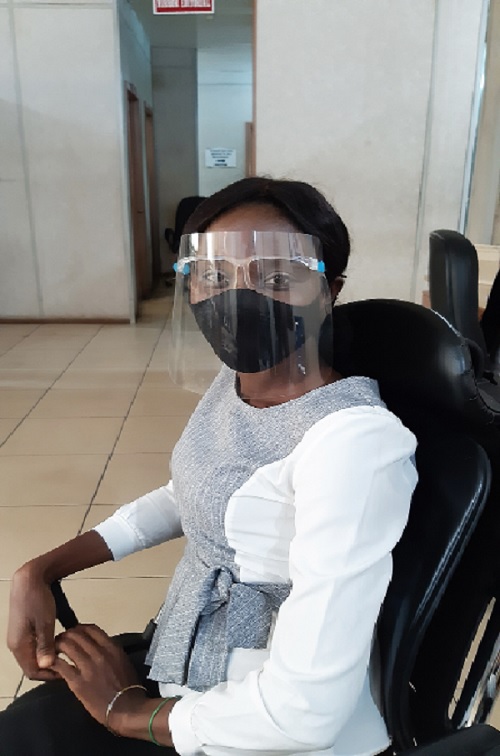
Face shield turns fashion
JUST as Ghanaians slowly adopted the use of face masks which have now become mandatory in public — as a critical protective kit to mitigate the risk of getting infected with COVID-19, the wearing of plastic face shields has also gradually gained acceptance, particularly for many who experience discomfort with the use of face masks for long hours.
While face shields have long been required as protective equipment for healthcare workers for some procedures in hospitals, cheaper plastic guards have suddenly flooded the Ghanaian market and are slowly becoming a preferred alternative for many.
However, beyond the limited health safety benefits of wearing them, the clear plastic shields appear to be turning into a fashion accessory, with medical experts expressing worry about their abuse or misuse.
They have sounded the alarm bells that the wrong use of face shields alone without a complementary face mask may not provide the needed protection from COVID-19.
These days, it is common to see some children sporting the transparent face shields to school, while it is also fast becoming a part of the uniform for workers at some grocery stores, or men and women wearing them without nose masks as they go about their daily activities.
On television, the story is no different as some news anchors, presenters, guests and performers on live shows are seen gleefully wearing just face shields because they enable them to communicate more effectively with appropriate visual cues, disregarding medical advice that the shields alone provide limited protection from pathogens without complementary nose masks.
With the easing of restrictions on social gatherings and reopening of churches, the plastic face shields are turning into the choice of personal protective equipment (PPEs) for women in particular as the face masks hinder or cover their makeup.
Flaunting of face shield
Similarly, at some weddings and traditional marriage ceremonies, it is commonplace to find the bridal party flaunting their face shields as part of their accessories.
The individual sense of style has found expression in very hip washable masks.
The face shields currently on the market also come in various designs and styles, including a combo that incorporates the see-through plastic into a mask to provide stronger protection for users with a desire for the classy aesthetic to suit their lifestyle.
Some customers told The Mirror that they were attracted to face shields because unlike the non-surgical nose masks that required washing after use, the plastic shields were reusable with minor cleaning.
However, medical experts insist the shield alone provides little protection if not worn properly.
Recently, Fellows and Members of the Ghana Chapter of the West African College of Surgeons (WACS) and the Ghana Medical Association (GMA) issued a joint statement signed by the GMA President, Dr Frank Ankobea, and Professor Peter Donkor, the First Vice-President and Country Representative of WACS, condemning the increasing use of face shields without masks as protection against COVID-I9.
The practice, according to the group, was a dangerous trend that had to be discontinued by the public with immediate effect as it could lead to increased cases of COVID-19 in the country.
Unfortunately, this sound medical advice seems to have fallen on deaf ears as there has been a surge in the use of the plain face shields, especially with the fall in the price of this type of equipment.
A few weeks ago, the face shield was a star item on the local market with vendors cashing in on the early demand for the PPE which sold as much as GH¢60 a piece, until merchants flooded the market with cheaper ones for as low as GH¢2.50 each to meet increasing demands.
The Centre for Disease Control and Prevention continues to recommend the wearing of cloth face coverings in public settings where social distancing measures are difficult to maintain.
Doctor’s reaction
Touching on the wrong usage of the face shields, a medical practitioner at the front line of COVID-19 management in Ghana, Dr Emmanuel Addipa-Adapoe of the Department of Internal Medicine at Pentecost Hospital, said: “Truth is, the virus survives longer on fomites such as plastics and metals like door handles and knobs, and survive much less on clothes.”
He noted that research in Switzerland found people wearing only face shields getting infected more than people wearing nose masks.
“After a coronavirus outbreak where only those wearing plastic visors were infected, the Swiss government has said plastic shields are inadequate protection and should be worn in combination with a face mask.”
Aside from this, he said health officials in the canton of Graubünden (Switzerland) studying a recent outbreak among staff at a hotel found a worrying trend - all of those who were infected wore plastic face shields, while those who avoided infection wore face masks.
“Several employees of the hotel tested positive along with a guest,” he said.
Dr Addipa-Adapoe said it was sad that some people in Ghana had decided to ignore all the precautionary measures put across by the GMA and WACS during these challenging times.
